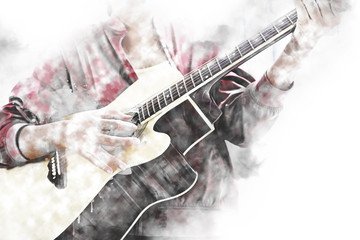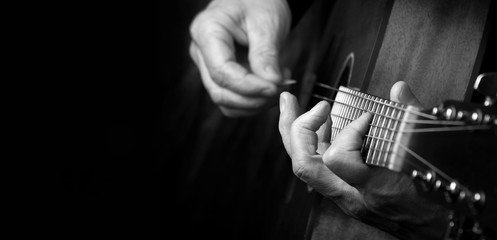How the Right Guitar Setup Revived a Guitarist’s Passion to Play
Alex had been playing guitar in a rock band since he was a teenager. Music was his escape, his passion, and the way he expressed everything he felt. But after a life-changing accident left him with a disability, he feared he’d lost his connection to the music he loved.

A few years ago, Alex was in a motorcycle accident that limited mobility and strength in his left arm and hand. Alex went to physical therapy for several months, up until the point where he was no longer making progress and improving. For a guitarist, this was devastating. He found himself staring at his guitar in silence, the chords he once played effortlessly now feeling out of reach. Despite attempts to strum, frustration set in, and the joy he once felt was replaced by disappointment. Eventually, he put his guitar away, convinced he would never play again.
A New Hope
Months later, Alex stumbled upon a local guitar tech and player when he was searching for solutions for musicians with disabilities. Alex heard of adaptive equipment and thought maybe there could be a solution to his problem. Unsure of what to expect, he decided to check it out and talk to the guitar tech. There, he met Jake, a guitar technician in the Apopka-Orlando, FL area who had some ideas on how he could make playing a little easier for him. It was helpful that Jake also had been playing for years, so he understood how important it was for a musician to be able to play his guitar and do the thing he loves.
Jake listened to Alex’s story. Alex told him about his struggles with his left hand and his finger strength, and asked him if he had any ideas about what could help. Jake explained how the right guitar setup and adjustments could significantly improve not just sound, but also playability. Alex was skeptical but decided to bring his guitar to Jake and have him look at it.
Together, they examined his guitar. Jake suggested several modifications, including adjusting the action—the height of the strings above the fretboard—to make it easier for Alex to press down the strings. He recommended lighter gauge strings, which required less finger strength. The real magic happened when they began experimenting with different tunings.
Jake showed Alex open tunings, which would allow him to play chords without complex finger positioning. Alex knew about this, but sometimes it’s necessary to be reminded, and at that moment it was like a heavy weight being lifted off his shoulders.
He watched and listened as Jake played a few notes. His heart raced at the rich, full sound that filled the room—a sound that felt both familiar and new. He felt a spark reignite within him.
Reconnecting with Music

With each adjustment and new tuning, Alex grew more comfortable and confident. It was as if the guitar was speaking to him in a language he hadn’t heard in years. He spent a few hours talking to Jake and they actually played a few songs together, which really helped to boost Alex’s confidence. He was strumming and experimenting, with Jake guiding him through the process while making a few more minor tweaks to the guitar, as he was getting used to the new playing style.
After that transformative day, Alex rushed home to practice. He began writing new songs, experiencing an emotional release he hadn’t felt in far too long. The music flowed through him like it always had, but now with a fresh perspective.
Sharing the Journey
Today, Alex is back playing gigs with his band, and it feels surreal. They’ve incorporated some of the open tuning techniques into their songs, adding a unique twist to their sound. More importantly, Alex learned that passion and adaptability go hand in hand.
For anyone struggling with a disability or any obstacle, Alex’s journey serves as a reminder that there’s always a way back to your passion. Sometimes, all it takes is the right setup and a little creativity. He is grateful to Jake for helping him find his way back.
So, keep playing, keep pushing, and remember: your sound is still waiting for you.


